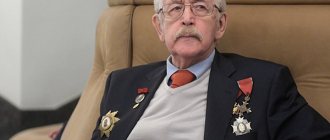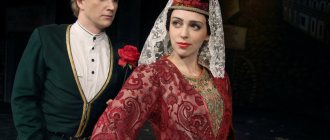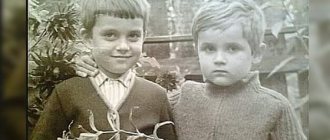Biography
Mysterious and detached, as if not from this world, Innokenty Mikhailovich Smoktunovsky created and embodied on the screens the image of a naive, pure genius, an incomprehensible and touching intellectual.
Actor Innokenty Smoktunovsky
According to the recollections of directors and colleagues, it was impossible to work with Smoktunovsky as with other actors: he was a master, a creative person, and therefore could fully reveal himself only in conditions of maximum comfort for himself. And these conditions were created for Innokenty Mikhailovich. Only for him.
Personal life of the legend of Soviet cinema
Innokenty's first wife was his colleague on the theater stage, Rimma Bykova. The couple lived under the same roof for two years. The reason for the separation was the betrayal of his wife, whose feelings had cooled. After the divorce, Smoktunovsky moved to Moscow, where he met Shulamith Kushnir.
In the second marriage, three children were born. The eldest girl, Nadezhda, died at the age of six months. In 1957, the actor’s heir, Philip, was born, and in 1965, daughter Maria was born. Innocent dreamed that his children would follow in his footsteps, but they had other plans for this.
Philip became a translator, and Maria was in charge of the Moscow Art Theater Museum. Innokenty's son married ballerina Olga Butskevich, who gave birth to his daughter Anastasia. The girl followed in the footsteps of her eminent grandfather.
Now he plays in the Armen Dzhigarkhanyan Theater. In 1994, Smoktunovsky suffered a heart attack, which caused sudden death. The artist was buried at the Novodevichy cemetery next to the graves of Oleg Borisov and Ivan Kozlovsky.
Childhood and youth
Innokenty Mikhailovich was born in March 1925 in the village of Tatyanovka, in the Tomsk province (now Tomsk region), in the family of Mikhail Petrovich and Anna Akimovna Smoktunovich, he became the second child. He is Jewish by nationality, but in his questionnaires he wrote that he was Belarusian. The ancestors were exiled to Siberia after the suppression of the uprising of Polish Jews in the mid-19th century.
When the boy was 4 years old, the family fled from hunger to Tomsk, and later to Krasnoyarsk, where the Smoktunovskys had relatives. The situation there has improved a little. The head of the family worked as a loader at the port, Innocent’s mother got a job at a sausage factory, but she still had to live from hand to mouth. In order to feed herself, Anna Akimovna had to steal bones with leftover meat from work and use them to prepare soups and broth.
Innokenty Smoktunovsky (left) with his brother and aunt
In 1932, when famine reached Krasnoyarsk and Anna was fired, the older children Kesha and Volodya had to be raised by Aunt Nadezhda Petrovna and her husband. The couple, who did not have children of their own, sincerely fell in love with the boys, and life became relatively prosperous.
Smoktunovsky studied poorly, was not interested in school subjects, showed free-thinking and a quick temper, which the teachers really did not like. In addition, the boy did not recognize authority and often got into fights. While in the 6th grade, Innokenty, already in love with the theater, enrolled in the school drama club, but was soon kicked out. Having appeared on stage on the day of the play's premiere, the teenager burst out laughing in front of the audience out of excitement and, as a result, was never able to perform. However, despite this episode, the theater continued to attract the young man. By hook or by crook, Kesha tried to get to the performances of the city theater.
Innokenty Smoktunovsky in his youth
The situation was complicated by the fact that there was no money, and for the sake of the cherished action, the guy took risky and often illegal steps, including forging tickets. Later, Innokenty got a part-time job as an extra in the theater, and then entered the school of projectionists, and it seemed that life was getting better, until another disaster happened.
The Great Patriotic War began, my father was taken to the front. The young man was forced to combine his usual activities with part-time work in order to help his family, in which four children were growing up. At the end of 1942, news came that Mikhail Smoktunovich had died, and a few months later Innokenty himself was taken away to fight.
Innokenty Smoktunovsky in his youth
The great actor later spoke about that period of his life in interviews and autobiography. For 2 years, the young man managed to be in captivity, from which he escaped only thanks to the unexpected help of one German soldier. Innocent survived a famine that almost brought him to the grave, and was saved only because a family of peasants sheltered him, fed him and looked after him, risking everything.
Throughout his life, Smoktunovsky carried a feeling of deep gratitude and after the war did not lose touch with his benefactors.
Smoktunovsky hid the truth about himself all his life
He played geniuses and neurasthenics, said that his character was shaped by the suffering he experienced, and considered himself a typical product of his time. “I am an actor on a cosmic scale,” said Smoktunovsky. At the same time, he managed to be a modest and scandalous person at the same time. In front of the camera, while working on a picture, he sometimes timidly whispered words, but in life he staged noisy fights with scuffles and smashing of plates, sorting out the relationship with his first wife’s lover.
The appearance of an aristocrat - peasant origin - broken fate - Jewish surname. They said that he was a successful Soviet artist, favored by the authorities. But no one even imagined that all the roles he played were connected to a monstrous personal grief...
In fact, his last name is Smoktunovich. He wrote in his questionnaires that he was Belarusian, but he was deceiving. Smoktunovsky comes from a family of Polish Jews; his great-grandfather was exiled to Siberia for participating in the Polish uprising of 1863. The actor was born in the village of Tatyanovka, Tomsk region. Then the family moved to Krasnoyarsk, where they were so hungry that at the age of five, his parents simply kicked him and his brother out of the house - they could not feed him. He was sheltered and raised by his aunt. He stole from the market to survive. Brother Innocent soon died...
Smoktunovsky studied poorly and stayed for the second year. After school, we were mobilized and immediately sent to the front - to hell itself - to the Kursk Bulge. Within a few months, Innokenty Smoktunovsky found himself in... fascist captivity. Talking later about this time of his life, the actor said that he always felt that someone was protecting him. He believed in miracles. He assured that he had never been wounded even though he had been in the thick of war.
“When I was at the front, people fell and died next to me, but I was alive... At that time I had not yet had time to play Myshkin, Hamlet, Tchaikovsky - nothing! Fate protected me."
He also considered it to be the hand of providence that he, a boy who had escaped from the Nazis and was dying of exhaustion, was allowed into the house, saved, and went out into a peasant hut by complete strangers, whom he found and thanked after the war.
He was withdrawn and anxious. In my youth I never even dreamed of being an actor. A friend entered the studio at the Krasnoyarsk Drama Theater, and he went along with the company. He received the profession that became his life’s work from 1945 to 1946, or rather, only 3 months - then he was kicked out for a fight with the wording “He opposed himself to the team.” The facts of his being in captivity were immediately “discovered”. And then he exiled himself to Norilsk. I went there, reasoning like this: there was nowhere to exile further than this camp city. It was then that he changed his last name Smoktunovich to Smoktunovsky.
They offered him the surname Slavyanin - he did not agree. In Norilsk, he learned what homosexuality was (among the prisoners there were people with non-traditional orientation). As the actor’s son, Philip, later said, he had an aversion to pederasty all his life. In the North, Smoktunovsky fell ill with scurvy and lost all his teeth. To save his life, he left the city and worked as a janitor for a year. Then he entered the Stalingrad theater and got married for the first time.
Throughout the first half of his life - his youth, his youth - he suffered. From hunger and poverty, from unrequited love (his first wife Rimma Bykova cheated on him and soon left him), from the misunderstanding of others, from the rejection and ridicule of his colleagues. He fought, closed in on himself, learned to survive and, despite everything, believed in a better future.
In 1955, Smoktunovsky goes to Moscow. No one is waiting for him or calling him there. He lives with friends, tries to find work in the theater - they don’t take him. Spends the night on windowsills in doorways. He's been hanging around on the street for a week in just his ski suit - the people he's staying with went on vacation and didn't leave the keys.
And then a miracle happened. He loved to remember it: “It’s so good to live, it’s amazingly good to just live, breathe, see. I am, I will be, because she came.” Smoktunovsky met his future wife, Shulamith, in Lenkom. She worked as a costume designer. “That was the first time I saw her... Thin, serious, with a shock of amazing heavy hair. She walked slowly, as if she was descending from a long, long staircase, and there were only three steps down. She got off them, came level with me and silently, calmly looked at me. Her look didn’t ask anything, and, perhaps, didn’t say anything... but all of her, especially when she came down, and even now, standing straight and calmly in front of me, seemed to be saying: “I’ve come!” Well, come and find out that it is this fragile person who has just come to me, but who has already managed to demonstrate some traits of his character, will give me children, will become a part of my life - myself.”
From this meeting his life changed. He got a house, a job, children - Philip and Masha. The future wife, 28-year-old Shulamith, had many friends in the capital’s artistic community. She had never been married and was in no hurry. She was happy and self-sufficient. Smoktunovsky was introduced to Ivan Pyryev, who ordered the actor to be placed in the Film Actor’s Theater-Studio. And then the real roles appeared. Myshkin in the Bolshoi Drama Theater by Georgy Tovstonogov, the noble swindler by Ryazanov in “Beware of the Car.” Smoktunovsky’s roles included Hamlet, Tchaikovsky, Mozart, Bach... He saw the funny in the greats and, in fact, played himself in films and on stage. Admirers and envious people appeared.
“Dad told me that some colleagues wrote denunciations against him either to Goskino or to the Union of Cinematographers,” said Smoktunovsky’s son Philip. – So they, as it seemed to them, defended the interests of Soviet art.
Smoktunovsky was an actor who broke all the rules and combined all the contradictions. The great holy fools, their own and not of this world. Master and serf. Maybe not Soviet, but dear.
Innokenty Mikhailovich Smoktunovsky was born on March 28, 1925. He took part in the battle on the Kursk Bulge, in the crossing of the Dnieper, and the liberation of Kyiv. He was captured and escaped. Reached Berlin. Died August 3, 1994. Son Philip (53 years old) is a translator of science fiction literature. Granddaughter is actress Anastasia Butskova (28 years old). Daughter Maria Smoktunovskaya (45 years old) is a ballerina, an employee of the Moscow Art Theater Museum.
Theater
At the end of the war, Innocent returned to his family. Having tried several areas of activity, the young man again got a job in the theater studio at the Krasnoyarsk Theater. Extras were sometimes invited to play in productions, so soon enough Smoktunovsky had the opportunity to go on stage.
Innokenty Smoktunovsky as Hamlet
However, the lack of special training took its toll: every time during the performance the young man became tense, his speech became quiet and slurred. The director expressed complaints to the unlucky actor, who responded sharply and nervously. Due to constant conflicts, less than a year later Innocent was kicked out of the theater.
In search of happiness, Smoktunovsky went to Norilsk, where he was lucky enough to get a job at the Second Polar Theater of Musical Comedy and Drama. At the same time, Innokenty changed the surname Smoktunovich given at birth to a pseudonym by which the viewer knows him. They say that the artistic director of the theater insisted on this. Others claim that the actor changed his last name voluntarily so that he would not be mistaken for a Jew.
Innokenty Smoktunovsky and Tatyana Doronina on stage
In Norilsk, thanks to the support of his colleagues, Smoktunovsky went through acting school, got rid of his inhibitions and was finally able to reveal himself as an amazing artist. Almost instantly, Innokenty began to receive leading roles in plays.
Gradually, the northern climate began to undermine the actor’s health, and Smoktunovsky was forced to exchange Norilsk for Makhachkala. There, the actor managed to get into the Dagestan Russian Drama Theater, but soon became bored without interesting roles and the next year he moved again, this time to Stalingrad, where at the same time the restoration of cultural life began.
Innokenty Smoktunovsky on stage
Having played a cameo role in the play “The Taming of the Shrew,” Innokenty was able to gain attention from the press and established himself as an actor who can “pull out” and make even a tiny role stand out. Smoktunovsky began to embody more significant characters and soon became a theater star. But the conflict gradually grew between the actor and the main director of the Gorky Theater. Later, Innokenty had a quarrel with his wife, who worked in the same theater, and this was the last straw. In January 1955, the artist quit and left for Moscow.
Smoktunovsky did not immediately manage to gain a foothold in any of the major capital theaters. For several months, the actor sold personal belongings, periodically spent the night and dined with close friends of the Markovs, then worked part-time at the Lenin Komsomol Theater for meager money.
Actor Innokenty Smoktunovsky
Innocent was saved by his acquaintance with Sulamith Kushnir, his future wife. Imbued with sympathy for the young man, the girl, who at that time worked as a make-up artist, introduced him to Ivan Pyryev, who got the performer a job at the film actor’s studio theater.
In 1957, by a happy coincidence, Smoktunovsky received the role of Prince Myshkin in the production of “The Idiot” at the Bolshoi Drama Theater. Thanks to this role, fame came to the actor, and not only in Moscow, but throughout the Soviet Union.
Innokenty Smoktunovsky as Prince Myshkin
The union of two geniuses Georgy Tovstonogov and Innokenty Smoktunovsky literally shocked the theater world. Innokenty began to work at the Bolshoi Drama Theater, playing leading roles in several performances. At the same time, the artist began actively acting in films. It soon happened that due to filming, Smoktunovsky was late for the start of the season in his native theater. The hot-tempered Tovstonogov fired the actor. This happened in 1960.
Innokenty Mikhailovich returned to the theater only in the 70s and over the next 20 years he played in many performances that strengthened and increased his fame. The stage duet of Smoktunovsky and Oleg Efremov especially stood out.
Innokenty Smoktunovsky and Oleg Efremov
Until the last years of Innokenty Mikhailovich’s life, the two friends often played together.
Stolen bones and fake tickets: the childhood of Kesha Smoktunovich
Little Kesha Smoktunovich, and this is his real name, was born on March 28, 1925 in the Tomsk province. His maternal grandfather, merchant Akim Makhnev, was dispossessed, arrested and shot. The actor’s father was a miller, he was also dispossessed, he received a year in prison and three years of exile for “exploitation of labor” and selling bread at an inflated price.
When the boy was four years old, the family fled from hunger to Tomsk, and later to Krasnoyarsk, where his father’s aunt, Nadezhda Petrovna, lived. Life was hard - Kesha's mother, Anna Akimovna, had to steal bones from work to use for making soup. The boy had five more brothers and sisters; it was difficult to feed six children, and Kesha’s parents decided to give their two older sons to their childless aunt.
According to recollections, Smoktunovsky studied poorly and was not at all interested in school subjects. He often got into fights and was quick-tempered. In the sixth grade, Kesha began studying in the school drama club, led by the actor Sinitsyn, but after the first performance he was kicked out of the circle.
However, the theater still attracted the future actor; at the age of 14, he first came to the Krasnoyarsk Drama Theater. A.S. Pushkin. Many years later, he said that although the production was “bad in taste,” it made an indelible impression on the boy. However, the lack of money did not allow him to constantly attend performances, and Smoktunovich had to break the law, namely, counterfeit theater tickets.
With the advent of the war, Kesha’s father was called up to the front, but in August 1942 he went missing and, as it later turned out, died. During this difficult time, the boy had to support his family himself. He got a part-time job as an extra in the theater and entered projectionist school. But in January 1943 Innokenty had to go to war.
Photo: Kassin Evgeny, Mastyukov Valentin/TASS
Movies
Since the 1960s, the actor has actively acted in films; Smoktunovsky’s filmography includes a good one and a half hundred films. The most memorable films with his participation by the Soviet audience were “Beware of the Car”, “Tchaikovsky”, which brought an award at the festival in San Sebastian, “Hamlet”, which was awarded the Lenin Prize. The role of Porfiry Petrovich in “Crime and Punishment” was awarded the State Prize of the RSFSR.
Innokenty Smoktunovsky in the film “Beware of the Car”
The words of a “little-known artist” from Vladimir Menshov’s melodrama “Moscow Doesn’t Believe in Tears” have become one of the most frequently mentioned quotes from the Oscar-winning film. Critics noted that the crime boss in the comedy “Genius” with Alexander Abdulov will be more terrible and convincing than individual real mafia bosses.
In the teleplay “Mozart and Salieri” Smoktunovsky transformed into a brilliant composer, in “Little Tragedies” - already into a teacher and conductor who was considered his murderer.
Innokenty Smoktunovsky in the film "Genius"
Probably because of this extraordinary ability to combine feline softness and intelligence with toughness and sometimes cruelty in the image, Smoktunovsky was trusted with characters whose intonation or just one movement of the eyebrow made you freeze in mid-sentence or, conversely, run away without looking back. Tall height (184 cm) was also considered as a way of conveying majesty and status.
Innocent's performance as the British Prime Minister in the TV series "The Adventures of Sherlock Holmes and Doctor Watson" turned out to be unforgettable - a kind of combination of English stiffness and ardor in one bottle.
Innokenty Smoktunovsky in the series “The Adventures of Sherlock Holmes and Doctor Watson”
And how he was fascinated by the Emperor Justinian in the drama “Primordial Rus'”, who with a blissful smile sent his subordinates to death, the French king in “The Legend of Tila”, the Irkutsk governor in “The Star of Captivating Happiness”.
Throughout his creative life, the ensemble with Smoktunovsky consisted of the brightest actresses. In the detective story "Theft" based on the play by Jack London, Innokenty starred in tandem with Anastasia Vertinskaya, in "Anna and the Commander" - with Alisa Freundlich, in "The Ladies' Tailor" - with Tatyana Vasilyeva. In Sergei Gerasimov’s film “Mothers and Daughters,” the actor played the husband of Tamara Makarova and the father of Larisa Udovichenko.
Innokenty Smoktunovsky in the film “Mothers and Daughters”
The latest projects continued to be published after the death of Innokenty Mikhailovich. For example, “Dandelion Wine,” where the role of Smoktunovsky had to be voiced by Sergei Bezrukov, since they did not have time to record the soundtrack.
Biography of Innokenty Smoktunovsky
During these years, Innokenty Smoktunovsky began acting in episodic roles in films, making his debut in the film “Murder on Dante Street” (1956) directed by Mikhail Romm. After the role of Farber in the film “Soldiers” (1956), Smoktunovsky was noticed by Georgy Tovstonogov, who invited the actor to play the role of Prince Myshkin in the play “The Idiot” based on Fyodor Dostoevsky at the Leningrad Bolshoi Drama Theater (BDT). Smoktunovsky's performance in this performance brought him to the forefront of domestic actors. Smoktunovsky played on the stage of the Bolshoi Drama Theater until 1960, where he was involved in two more performances: “The Kremlin Chimes” by Nikolai Pogodin (the role of Dzerzhinsky) and “The Irkutsk Story” by Alexander Arbuzov (the role of Sergei Seregin).
In 1972-1976, the actor worked at the State Academic Maly Theater, where he played the main role of Tsar Fyodor in the production of “Tsar Fyodor Ioannovich” by Alexei Tolstoy.
Since 1976, Smoktunovsky has been an actor at the Gorky Moscow Art Theater (since 1989 - the A.P. Chekhov Moscow Art Theater, now - the A.P. Chekhov Moscow Art Theater). In the theater, he played the roles of Ivanov in “Ivanov”, Dorn in “The Seagull”, Serebryakov and Voinitsky in “Uncle Vanya”, Gaev and Firs in “The Cherry Orchard” by Anton Chekhov, Porfiry Golovlev in “The Golovlev Gentlemen” by Mikhail Saltykov-Shchedrin, King Louis XIV in Mikhail Bulgakov's "Cabal of the Holy Ones", Martin Deiser in Peter Schaeffer's "Equus", Johann Sebastian Bach in Paul Bartz's "Possible Encounter" and others.
In cinema, the originality and nervous sophistication of the artistic manner contributed to the creation of such diverse images as Konstantin Sabinin in “The Unsent Letter” (1959), Mozart in “Mozart and Salieri” (1962). Smoktunovsky’s great success was the role of physicist Kulikov in “Nine Days of One Year” (1961) by Mikhail Romm.
One of Smoktunovsky’s unsurpassed works can be considered the image of Hamlet in the film of the same name by Grigory Kozintsev. This film received special recognition abroad: in four years the film collected over 20 different awards.
In the role of Detochkin in Eldar Ryazanov’s film “Beware of the Car” (1966), Smoktunovsky’s comedic talent was clearly demonstrated.
Among the roles he played are the best images of Russian classics: Porfiry Petrovich in “Crime and Punishment” (1969) based on Fyodor Dostoevsky, Voinitsky in “Uncle Vanya” (1970) based on Anton Chekhov, Zakhar Bardin in “Enemies” (1978) and Pavel Protasov in the film “Children of the Sun” (1985) based on Maxim Gorky, Salieri and Baron in “Little Tragedies” (1979) based on Alexander Pushkin, Plyushkin in the series “Dead Souls” (1984) based on Nikolai Gogol, the role of composer Tchaikovsky in the film of the same name (1969).
Innokenty Smoktunovsky played leading roles in the films “Mothers and Daughters” (1974), “Barrier” (1979), “Theft” (1982), “Two Under One Umbrella” (1983), “Late Love” (1983), “Strange the story of Dr. Jekyll and Mr. Hyde" (1985), "The Mysterious Heir" (1987), "The Heart is Not a Stone" (1989), "The Ladies' Tailor" (1990), "The Sukhovo-Kobylin Case" (1991), "White Holiday" (1994) and others.
At the Leningrad Television Studio, Smoktunovsky staged the television play “The Winter of Our Anxiety.”
The actor read the author’s texts for the feature and documentary films “The Last Month of Autumn” (1966), “In Memory of Dostoevsky” (1971), “Boldino Attraction” (1980), “Asaf Messerer” (1989), etc.
On the radio, Innokenty Smoktunovsky, as a reader, recorded chapters from the novels “Oblomov” by Ivan Goncharov, “The Idiot” by Fyodor Dostoevsky and “Don Quixote” by Miguel Cervantes, excerpts from “Eugene Onegin” and “Boris Godunov” by Pushkin. He completely recorded Pushkin's fairy tales and his stories "The Captain's Daughter" and "Blizzard", Chekhov's story "The Black Monk", the stories of Ivan Turgenev, Guy de Maupassant, Konstantin Paustovsky and others.
Smoktunovsky wrote the books “Time of Good Hopes” (1979) and “To Be!” (1999).
On the night of August 3, 1994, Innokenty Smoktunovsky died of a heart attack in the Herzen sanatorium in the city of Kubinka near Moscow. He was buried at the Novodevichy cemetery in Moscow.
The artist’s work has been awarded numerous awards. In 1974 he was awarded the title of People's Artist of the USSR. In 1990, Smoktunovsky was awarded the title of Hero of Socialist Labor. He was a laureate of the Lenin Prize (1965), the State Prize of the RSFSR named after the Vasilyev brothers (1971), awarded three Orders of Lenin, the Order of Friendship of Peoples and the Order of the Patriotic War, II degree, and medals. The actor’s awards include the IFF in Cartagena (Colombia, 1969), the IFF in San Sebastian (Spain, 1970), the IFF of the author’s film in San Remo (Italy, 1991), two Nika awards (1990, 1993) and etc.
Smoktunovsky first married in 1950 to actress Rimma Bykova (1926-2008). In 1955, costume designer Shulamith Kushnir became the actor’s wife. The family had two children: son Philip (born in 1957) - a translator of science fiction literature, daughter Maria (born in 1965) - ballerina, actress, now an employee of the Moscow Art Theater Museum.
The material was prepared based on information from RIA Novosti and open sources
Personal life
The People's Artist of the Soviet Union freely shared details of his personal life in an interview. Innocent's first marriage to his stage colleague Rimma Bykova lasted 2 years. Gradually, the beauty lost interest in her husband and became interested in another man. Smoktunovsky could not tolerate such a turn of events, divorced his wife and left for Moscow, where he met Shulamith Kushnir.
Innokenty Smoktunovsky with his wife Shulamith
This girl, who lent a helping hand to the unknown actor, eventually became his companion for life.
Three children were born to this marriage. The eldest Nadya died 6 months after birth. The second child in 1957 was the son Philip. The couple had a daughter, Maria, in 1965. Innokenty Mikhailovich wanted the children to continue the dynasty, but the younger Smoktunovskys did not love the theater as much as their father.
Innokenty Smoktunovsky with his family
True, Maria, who danced at the Bolshoi Theater and then headed the Moscow Art Theater Museum, managed to appear in episodes of the films “The Sukhovo-Kobylin Case,” “Envy of the Gods,” and “The Ladies’ Tailor.” Philip became a translator. Granddaughter Anastasia, born into the family of Philip and ballerina Olga Butskevich, followed in her grandfather’s footsteps. The girl plays in the theater of Armen Dzhigarkhanyan.
Innokenty Smoktunovsky with his daughter Masha
According to his daughter, Smoktunovsky believed in God from his youth and collected icons, so he reacted with trepidation to the creation of the audiobook “Bible Stories.” The tape lay on the shelf for 15 years, then a limited edition of the records was released, of which only a few remained, and they are stored in the personal archives of fans. Recordings of Innokenty Mikhailovich reading Pushkin, Cervantes, Chekhov, and Dostoevsky are available on the Internet.
Another move
As soon as Innokenty got comfortable in Norilsk, he had to move to Makhachkala due to health problems. Here the artist became part of the troupe of the Dagestan Russian Drama Theater . But small roles and boring productions pushed Smoktunovsky to move again. This time the actor stopped in Stalingrad, where, in his opinion, many prospects opened up.
The first small role was participation in the play “The Taming of the Shrew.” Strict critics noted Smoktunovsky’s talent and potential, describing him as an actor who managed to make a big masterpiece out of a small role. Over time, Innocent won the trust of the director, the sympathy of the audience and the recognition of his colleagues.
At the peak of his popularity, Smoktunovsky had a row with the director and his wife, who worked at the Gorky Theater. Unable to withstand the nervous tension, the actor quit and left for Moscow.
Here the artist was in for complete disappointment. Innocent did not stay more than a month in any of the capital's theaters. Due to lack of money, the actor began to sell personal belongings and earn extra money at the Lenin Komsomol Theater.
Smoktunovsky’s future wife, artist-Gimer Shulamif Kushnir, helped him return the incentive to life. The girl introduced the emotional actor to director Ivan Pyryev, who acted as Innokenty’s protégé. He arranged for a negligent artist to work as a theater judge for a film actor. In 1957, Smoktunovsky played the main role of Prince Myshkin in the production of “The Idiot”.
After a quarrel with the director of the Bolshoi Drama Theater Georgy Tovstonogov, Innokenty took a creative break, focusing on filming. Only in the early 70s did the actor return to the theater stage . Productions with the participation of Smoktunovsky and Oleg Efremov were especially popular.
Death
The cause of Smoktunovsky's death in August 1994 was a heart attack. According to relatives, the actor suffered the previous one back in March. He did not recover, but continued filming in the films “White Holiday” and “Attraction of the Sun.” Moreover, in both, Innokenty Mikhailovich played old people whose lives were nearing the end. After completing work, I went to a sanatorium, and after a couple of days I wanted to return home. Relatives came to pick up the deceased artist - he did not survive his fourth heart attack.
Grave of Innocent Smoktunovsky
Farewell to the famous actor took place at the Chekhov Moscow Art Theater. Those present later recalled the photo displayed on the stage: “The penetrating gaze of Prince Myshkin.” The grave of Innokenty Smoktunovsky is located at the Novodevichy Cemetery, in the same row as Oleg Borisov and Ivan Kozlovsky.
Works of Innokenty Mikhailovich Smoktunovsky
Works on television
- 1957 - “The Dear of Immortality” by V. Bragin (television play); production by A. Chiginsky and G. Tovstonogov - Julius Fucik;
- 1963 - “The Winter of Our Anxiety”, based on D. Steinbeck (television play); production by R. Sirota - Ethan Allen Hawley;
- 1971 - “Little tragedies” based on A. S. Pushkin; production by L. Vivien, A. Dawson, L. Pchelkin - Mozart;
- 1976 - “The Cherry Orchard” based on A.P. Chekhov (television play); production by L. Heifetz - Gaev;
- 1979 - “Caesar and Cleopatra” by Bernard Shaw (television play); production by A. Belinsky - Caesar;
- 1981 - “Ivanov” based on the play by A. P. Chekhov (television play); directors O. Efremov, S. Desnitsky, V. Khramov - Nikolai Alekseevich Ivanov;
- 1982 - This fantastic world. Issue 7 based on the stories by O. Lukyanov “The Principle of Uncertainty” and A. Porges “Valuable Commodity” (television play); director V. Spiridonov - captain;
- 1983 - Three cards (film-ballet) based on A. Pushkin’s story “The Queen of Spades” (television play); directors B. Baranovsky, V. Bunin;
- 1987 - “The Idiot” based on F. M. Dostoevsky (television play); directors B. Eifman, F. Slidovker;
- 1988 - “The Cabal of the Saint” based on Mikhail Afanasyevich Bulgakov (television play); production by A. Ya. Shapiro - King Louis XIV;
- 1992 - “Possible meeting” based on P. Bartz (television play); directors V. Dolgacheva, S. Satyrenko - Johann Sebastian Bach;
- 1995 - “The Dreamer” based on F. M. Dostoevsky (television play); production by M. Dubrovina - Karl Fedorovich Meyer;
- 1998 - “Uncle Vanya. Scenes from village life[en]” by A.P. Chekhov (television play); production by O. Efremov - Voinitsky.
Theater works
Moscow Art Theater and Moscow Art Theater named after Chekhov:
- 1976 - “Ivanov” by A. P. Chekhov; production by O. N. Efremov - Ivanov;
- 1977 - “Feedback” by A. I. Gelman; production by O. N. Efremov - Sakulin;
- 1979 - “Kremlin chimes” N. F. Pogodin - Watchmaker;
- 1980 - “The Seagull” by A. P. Chekhov; production by O. N. Efremov - Dorn;
- 1983 - “So we will win!” M. Shatrova; production by O. N. Efremov - Lenin's Companion and Professor (since 1988);
- 1984 - “The Golovlevs” by M. E. Saltykov-Shchedrin; production by L. A. Dodin - Porfiry Golovlev;
- 1985 - “Uncle Vanya” by A.P. Chekhov; production by O. N. Efremov - Serebryakov and Voinitsky (since 1988);
- 1986 - “Toastmaster” by A. M. Galin; production by K. M. Ginkas - Revaz;
- 1988 - “The Cabal of the Saint” by M. A. Bulgakov; production by A. Ya. Shapiro - King Louis XIV;
- 1990 - “The Cherry Orchard” by A. P. Chekhov; production by O. N. Efremov - Gaev / Firs;
- 1990 - “Equus” by P. Schaeffer - Martin Deiser;
- 1992 - “Possible meeting” by P. Bartz; production by V. V. Dolgachev - J. S. Bach.
Norilsk Polar Theater of Drama and Musical Comedy:
- 1946 - “Someone else’s child” by V.V. Shkvarkin - Kostya;
- 1946 - “Mashenka” by A. N. Afinogenov - Viktor Tumansky;
- 1947 - “Old Friends” by L. A. Malyugin - Semyon Gorin;
- 1947 - “The Last” by M. Gorky - Peter;
- 1947 - “Children of Vanyushin” by S. A. Naidenov - Alexey;
- 1948 - “The Fault” by Boris Andreevich Lavrenev - Polevoy;
- 1948 - “Taimyr is calling you” by Alexander Arkadyevich Galich and K.F. Isaev - Grishko;
- 1949 - “Profitable Place” by A. N. Ostrovsky - Mykin;
- 1949 - “Mozart and Salieri” by A. S. Pushkin - Mozart;
- 1950 - “Late Love” by Alexander Nikolaevich Ostrovsky - Dormidont;
- 1951 - “Jokers” by A. N. Ostrovsky - Nedonoskov;
- “Spring Love” by K. A. Trenev - Ivan Kolosov;
- “Conspiracy of the Doomed” by N. E. Virta - monk Yakov.
Stalingrad Regional Theater named after M. Gorky:
- 1953 - “The Inspector General” by Nikolai Vasilyevich Gogol - Khlestakov;
- 1953 - “The Great Sovereign” by V. A. Solovyov - Magnus;
- 1953 - “The Taming of the Shrew” by W. Shakespeare - Biondello;
- 1954 - “The Snow Queen” by E. L. Schwartz - Storyteller;
- 1954 - “Profitable Place” by A. N. Ostrovsky - Belogubov.
Dagestan Russian Drama Theater named after. M. Gorky:
- 1952 - “Family” by I. F. Popov - Alexander Ulyanov;
- 1952 - “Wedding with a dowry” N. M. Dyakonov - Muravyov;
- 1952 - “Her Friends” by V. S. Rozov - Victor;
- 1952 - “The Inspector General” by N.V. Gogol - Khlestakov.
Maly Theater:
- 1973 - “Tsar Fyodor Ioannovich” by A.K. Tolstoy; production by B.I. Ravenskikh - Tsar Fyodor.
Theater-studio of film actor:
- 1955 - “At the Dangerous Line” by V. A. Lyubimova - Underachiever;
- 1955 - “Angelo” by Victor Hugo - Apafesto;
- 1955 - “How he lied to her husband” B. Shaw - Henry;
- 1955 - “Mashenka” by A. N. Afinogenov - Viktor Tumansky;
- 1955 - “The Last” by M. Gorky - Peter.
Bolshoi Drama Theater named after Gorky:
- 1957 - “The Idiot” by F. M. Dostoevsky; production by G. A. Tovstonogov - Prince Myshkin;
- 1957 - “Kremlin chimes” by N. F. Pogodin; production by V. Ya. Sofronov and I. P. Vladimirov - Dzerzhinsky (input);
- 1960 - “Irkutsk History” by A. N. Arbuzov; production by G. A. Tovstonogov - Sergey Seryogin.
Enterprise by N. Schlesinger (USA[en]):
1992 - “From the life of earthworms” by P. W. Enquist; production by I. Smoktunovsky and V. Lansky - Hans Christian Andersen.
Filmography
Year - Title - Role:
- 1956 - Murder on the street Dante - a young Nazi;
- 1956 - How he lied to her husband - Henry;
- 1956 - Soldiers - Farber;
- 1957 - Next to us - Andrey Korolev;
- 1957 - Storm - Muromtsev;
- 1958 - Day one - V. A. Antonov-Ovseenko;
- 1958 - Night Guest - Pal Palych;
- 1959 - Unsent letter - Sabinin;
- 1960 - Until next spring - Alexey Ruchyev;
- 1961 - Leap Year - Gennady Kupriyanov;
- 1961 - Nine days of one year - Ilya Kulikov; (released on national screens on March 5, 1962);
- 1962 - Mozart and Salieri - Mozart;
- 1963 - If a comrade calls - Shatalov;
- 1964 - Hamlet - Hamlet;
- 1965 - On the same planet - Vladimir Ilyich Lenin;
- 1966 - Beware of the car - Yuri Detochkin;
- 1966 - First visitor - V.I. Lenin;
- 1968 - First love - Pyotr Vasilyevich;
- 1968 - Degree of risk - Alexander Kirillov;
- 1968 - Living Corpse - Ivan Petrovich “Genius”;
- 1969 - Crime and Punishment - Porfiry Petrovich;
- 1969 - Tchaikovsky - Pyotr Ilyich Tchaikovsky;
- 1970 - Uncle Vanya - Ivan Petrovich Voinitsky;
- 1971 - Ilf and Petrov, a passenger, were traveling on a tram;
- 1972 - Night for Reflection - main role (two double roles - Intellectual and Antipode;
- 1972 - Taming of Fire - Konstantin Eduardovich Tsiolkovsky;
- 1973 - Moscow - Cassiopeia - I.O.O. (performing special duties);
- 1973 - Fulfillment of desires - Dmitry Bauer;
- 1974 - Mothers and Daughters - Vadim Antonovich;
- 1974 - Romance about lovers - trumpeter;
- 1974 - Youths in the Universe - I.O.O. (performing special duties);
- 1974 - Anna and the Commander - Vadim Petrovich, playwright;
- 1974 - Selecting a target - Franklin Delano Roosevelt;
- 1975 - My heart is in the mountains [en] - Mr. Kozak;
- 1975 - Star of Captivating Happiness - Ivan Bogdanovich Zeidler;
- 1975 - They fought for their homeland - surgeon;
- 1975 - Trust - Governor of Finland Bobrikov;
- 1976 - Fantasy - Dmitry Sanin;
- 1976 - Days of the surgeon Mishkin - Pakhom Grigorievich;
- 1977 - The Legend of Thiel - Charles V;
- 1977 - The Princess and the Pea - King Father;
- 1977 - Steppe - Moisey Moiseevich;
- 1977 - On Thursday and never again - Ivan Modestovich, Sergei's stepfather;
- 1977 - Enemies - Zakhar Bardin;
- 1978 - Velvet Season - Commissioner;
- 1979 - Barrier - Antony Manev;
- 1979 - Moscow does not believe in tears - Smoktunovsky (cameo);
- 1979 - Little tragedies - Salieri (“Mozart and Salieri”); Baron (“The Stingy Knight”);
- 1981 - Born of the Storm - old count;
- 1981 - A joke? — Gross;
- 1982 - I visited again... - reads poems by A. S. Pushkin;
- 1982 - Theft - Anthony;
- 1982 - Queen of Spades - Chekalinsky;
- 1983 - Two under one umbrella - Til;
- 1983 - Late love - Gerasim Porfiryevich Margaritov;
- 1983 - Awakening - General Gippius;
- 1983 - Unicum - San Sanych;
- 1984 - Dead Souls - Plyushkin;
- 1985 - Children of the Sun - Protasov;
- 1985 - The Strange Case of Dr. Jekyll and Mr. Hyde - Dr. [en] Jekyll;
- 1985 - Primordial Rus' - Emperor Justinian;
- 1986 - The Last Road - Baron Gekkern;
- 1986 - Sherlock Holmes in the 20th century - Lord Thomas Ballinger, Prime Minister of England;
- 1986 - Black Eyes - Modest Petrovich, mayor;
- 1987 - Without the sun - Baron;
- 1987 - Midshipmen, forward! - Cardinal Fleury;
- 1987 - The mysterious heir - Vasily Grigorievich Erikhonov;
- 1987 - At the end of the night - Seifert;
- 1987 - First meeting, last meeting - counterintelligence colonel;
- 1988 - Forbidden Zone - Artyom Grigorievich Kalanchev;
- 1988 - Black Corridor - Nikolai Ivanovich Echevin, history teacher;
- 1989 - Heart is not a stone - Potap Potapych Karkunov;
- 1989 - Mother - governor;
- 1990 - Trap for a lonely man - Father Merlush;
- 1990 - Ladies' Tailor - Isaac, ladies' tailor;
- 1991 - Dina - Bardov;
- 1991 - Genius - crime boss “Prince”;
- 1991 - Case - Muromtsev;
- 1991 - The Sukhovo-Kobylin case - Pyotr Konstantinovich Muromsky;
- 1991 - Death Line - Lukovetsky;
- 1991 - Siege of Venice - inquisitor;
- 1991 - Ivan Fedorov, or the Revelation of John the First Printer - Tsar Ivan the Terrible;
- 1992 - Gold - Don Diego;
- 1993 - Killer - investigator;
- 1993 - I want to go to America - writer;
- 1994 - White Holiday - Professor Greg;
- 1994 - Bewitched - taster;
- 1994 - Dedication to love - Ivan Bunin;
- 1994 - Trip to the East - Mikolay;
- 1995 - Dandelion Wine - Colonel Freeley (the role was voiced by Sergei Vitalievich Bezrukov);
- 2000 - Memoirs of Sherlock Holmes - Prime Minister Lord Thomas Ballinger;
- 2001 - Clock[en] without hands - Valentin.
Participation in films
- 1967 - Evgeniy Urbansky (documentary) - talks about Evgeniy;
- 1971 - Wherever I am (documentary);
- 1974 - The World of Nikolai Simonov (documentary);
- 1981 - The Last Garden (documentary) - reads excerpts from the works of A. Chekhov;
- 1985 - Mikhail Romm: Confession of a Film Director (documentary);
- 1990 - Laureates of the 9th International Tchaikovsky Competition play and sing (documentary).
Voice acting
Year - Title - Role:
- 1952 - Footlights - Calvero (role of Charles Chaplin);
- 1955 - Give me your hand, my life - Mozart (role of O. Werner);
- 1957 - The King in New York - the king of the Shads (role of Charles Chaplin);
- 1959 - Toktogul;
- 1960 - Guys from Kanonersky - Mikhail (role of L. Borisov);
- 1961 - Thank you for the spring - Jean Mezmal (role of E. Pavuls);
- 1962 - After the wedding - voiceover;
- 1965 - The last month of autumn - text from the author;
- 1966 - The Little Prince - Pilot (role of O. Koberidze);
- 1966 - Poem of two hearts - Lohari (role of T. Rejametov);
- 1966 - Captured by Siberia (documentary) - reads the text;
- 1970 - Algebra of Revolution (popular science) - text behind the scenes;
- 1971 - In Memory of Dostoevsky (documentary) - read[en] the text;
- 1972 - Inspector. Scenes from the play (film-play) - voice-over;
- 1972 - Alarming chronicle (documentary) - text behind the scenes;
- 1974 - Mirror - text from the author;
- 1974 - Heron and Crane (animated) - text from the author;
- 1975 - Russian folk theater - reads the text;
- 1976 - When the snow goes away (short film) - text from the author;
- 1976 - Twenty days without war - Vyacheslav (role of N. Grinko);
- 1977 - I'm afraid - Judge Kanchedda (role of E. Josephson);
- 1977 - The Old House (animated) - reads a fairy tale by H. C. Andersen;
- 1977 - I am flying to you with memories... (animated) - reads poetry and prose by A. S. Pushkin;
- 1978 - Autumn Bells - reads a fairy tale by A. S. Pushkin;
- 1979 - About a puppy (animated) - puppy;
- 1980 - Boldino attraction - text behind the scenes;
- 1980 - Birth of an idea. Tsiolkovsky (documentary) - voiceover;
- 1980 - And I’m with you again... (animated) - dubbing;
- 1981 - Dangerous Age - Narkis Mikhailovich Rodimtsev (role of Yu. Budraitis);
- 1981 - Roots of Grass - reads the text;
- 1981 - Krepysh - reads the text (voice of Krepysh);
- 1981 - Talking Hands of Travancore (animated) - voiceover;
- 1981 - One Hundred Joys, or The Book of Great Discoveries - text from the author;
- 1981 - Caliph Stork (cartoon) - Caliph;
- 1982 - Roerich (documentary) - reads the text;
- 1983 - Path to Eternity - reads poems of Korean classical poetry translated by A. A. Akhmatova;
- 1983 - Boldino Insomnia - original text and poems by A. S. Pushkin;
- 1984 - Trip to India - Professor Godbole (role of A. Guinness);
- 1984 - Gray Ural (documentary) - voiceover;
- 1985 - On the Hunt - Cornelius (John Gielgud);
- 1985 - My sister Lucy - text from the author;
- 1986 - Academician Lavrentiev (documentary) - voiceover;
- 1986 - Hercules at Admet (animated) - old man;
- 1987 - My Favorite Time (animated);
- 1989 - Asaf Messerer (documentary) - voiceover;
- 1989 - Return of Khoja Nasreddin - Khoja Nasreddin and Timur Tamerlan (roles of R. Chkhikvadze and G. Gombosuren);
- 1989 - Under the blue sky... - Sobolev Sr. (role of Y. Budraitis);
- 1989 - The village of Stepanchikovo and its inhabitants (television play) - text from the author;
- 1990 - Mushroom hunting (documentary) - voiceover;
- 1990 - Another drama - Boris Leonidovich Pasternak (role of A. Smirnov);
- 1991 - Vivat, midshipmen! — King of Prussia Frederick (role of P. Butkevich);
- 1991 - On Ilych in autumn - voiceover;
- 1991 - Monster: Portrait of Stalin in Blood [en] (documentary) - reads the text;
- 1993 - commercials from the series “World History, Bank Imperial” - “Peter I[en]”, “Tamerlane”;
- 1993 - Time of Merab - behind-the-scenes text;
- 1993 - Origins (short film) - voiceover;
- 1994 - Dedication to love - text from the author.
Filmography about Smoktunovsky
- 1993 — “Innokenty Smoktunovsky. Memories in the Garden";
- 2001 - “To be remembered. Innokenty Smoktunovsky. Chapter 79 (author and presenter Leonid Alekseevich Filatov);
- 2008 - “My silver ball. Innokenty Smoktunovsky” (author and presenter V. Wulf);
- 2008 - “Historical Chronicles” 65th episode. 1963 - Innokenty Smoktunovsky (host N. Svanidze);
- 2010 — “Islands. Innokenty Smoktunovsky" (Director: V. Troyanovsky, );
- 2010 — “Talents and fans. Innokenty Smoktunovsky";
- 2010 - “Innokenty Smoktunovsky “My last name won’t tell you anything...” (TV Center TV channel. Scriptwriter - A. Yaroshevsky, director - A. Alenin);
- 2015 — “Innokenty Smoktunovsky. Beyond Reason" (CJSC Tele. Author and presenter - V. Pimanova);
- 2015 - “The Unlost Paradise of I. M. Smoktunovsky” (film of the State Television and Radio Broadcasting Company Krasnoyarsk).
Death of an actor
It is difficult to list the films and performances in which Smoktunovsky had to refuse to participate due to poor health. Malnutrition in childhood and hungry life in the Arctic affected his well-being.
He suffered three heart attacks, but after the fourth, while being treated in a sanatorium in the Moscow region, he died on the night of August 3, 1994. He was seen off on his final journey by crowds of people who gave him a standing ovation.
This was the first time in Russia that an actor was honored in this way. This shocked some, but many said: “On this last day, everything was as usual for Smoktunovsky.” The actor is buried at the Novodevichy cemetery in Moscow.











